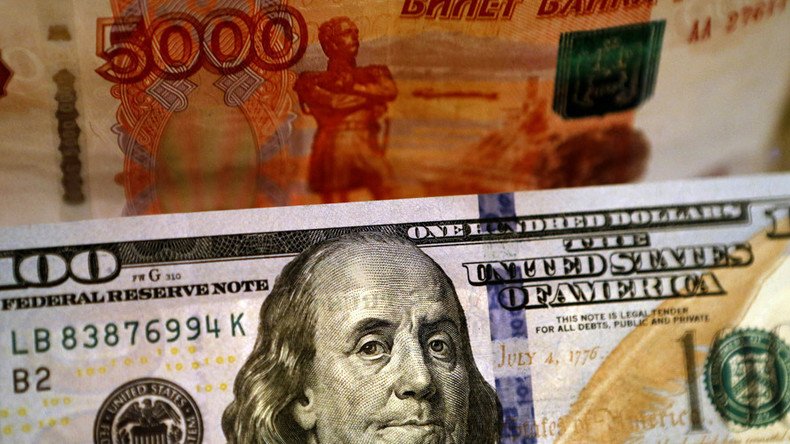Rumble in the ruble, fire in the markets

A case can be made that for Moscow it would be a tremendous waste of hard-earned foreign exchange – to try to counter a rig against their currency they simply cannot beat, as the entire fiat financial power of the US is against them.
Russia’s Central Bank by now should be all-out selling rubles for gold, and building Russia’s gold reserves.
Well, it is happening, somewhat. Last week, Russia’s Central Bank estimated gold reserves to have reached 1,415 metric tons in 2015 – over 17 percent more than 2014, valued at almost $48.6 billion. The share of monetary gold in Russia’s foreign currency reserves rose from 11.96 percent to 13.18 percent.
That’s still not good enough. Why? A harsh answer would be that the Russian Central Bank and the Ministry of Finance, as some analysts argue, are in effect run by saboteurs and vassals of the US financial elite, a.k.a. the Masters of the Universe.
Still, the Russian Central Bank did not intervene to prop up the ruble. And they should not. The best course of action would be to let the ruble go, ending almost all imports, thus forcing self-sufficiency. Or introduce capital controls, with only approved transactions involving foreign currencies. It did work for Malaysia, for instance, after the 1997 Asian financial crisis.
Russian Gold Reserves Up by 208 Tons in 2015 #Gold#RussianGoldReserves#RussianGoldhttps://t.co/w2Z50L1TiO
— Andrew Higgins (@AndrewHigsdrew) January 21, 2016Forget about a China crash
A serious case can be made that Russia does not need much Western foreign investment. That was mostly encouraged by the Central Bank, who held interest rates higher in Russia than the US and EU, naturally leading Russian companies to borrow abroad in US dollars or Euros.
The responsibility of Russia’s Central Bank is to create domestic credit to build the industries that have been cut off from Russia by the falling ruble. This is not inflationary; the increased production out of these investments would nullify the inflationary implications on the newly created credit.
The Russian Central bank instead went for tight money to fight inflation. It would have been much more profitable for Russia to fight inflation by creating credit at low interest rates to finance the construction of the industries necessary to replace the import of foreign products.
Now let’s look at the Russia-China strategic partnership. While Russia may be on the ropes, China is not. China will grow at an estimated 6.5 percent this year - versus 7 percent in 2015. Amid an astounding web of economic restructuring and de-leveraging, US multinationals such as Apple and GM certainly have no interest in a Chinese “crash”.
A key indicator to watch is the growth in China’s demand for oil. Construction has ebbed; but not car manufacturing, which is pumping out 25 million vehicles per year.
To deal with China, the Masters of the Universe deployed a different strategy; they tried to stop Chinese economic growth from fueling the rise in the oil price. Thus the offensive by the usual Wall Street suspects trying to crash China’s stock market using cash settlement on A shares. It did not work.
Now, the Masters of Universe, remote-controlling the Saudis, are essentially trying to pull the plug on global stock markets. One could call it a trillion dollar cash settlement derivative game. There’s no evidence this will be enough to break Russia.
The “assassin” versus the fifth column
Masters of the Universe hysteria on getting rid of President Putin (and reinstating vassal oligarchs) by any means available has reached fever pitch; the latest manifestation is “Putin The Assassin”, with crucial assistance provided by British “intelligence”.
There is no question Masters of the Universe operatives are behind the collapse in oil and ruble prices. Somewhat it’s a repeat of the scenario in mid-2014, when the oil price crashed and there was no visible increase in output; what happened was the - invisible - dumping of seven million barrels a day of Gulf oil under orders by the Masters of the Universe, according to surefire (American) banking sources.
The Fed mightily contributed to the present disorder by raising interest rates when the US economy was sick, while cash settlement manipulators in Wall Street used this as the basis for their move to tank the markets. It goes without saying that the usual suspects will make hundreds of billions of dollars out of the current market crash. A good place to watch is what goes on inside BlackRock.
Into this gloomy scenario steps in none other than the aspiring Master of the (New) Universe, Chinese President Xi Jinping, in his high-profile tour of the Middle East. Xi’s three-pronged business/charm offensive in Saudi Arabia, Iran and Egypt should be interpreted as Beijing’s shot at reshaping Southwest Asia in a framework closer to the Shanghai Cooperation Organization (SCO).
Xi as much as anyone knows very well how the whole American economy - based on a worthless global reserve currency – is fuelled by a rapacious, barely disguised tribute, paid by every nation in the world to the Empire of Chaos. And Xi knows how this tribute scam is unraveling, fast.
In Riyadh, Xi even implied, in a very Chinese, nuanced way, that the House of Saud would be doing a very good deal if it eventually dropped Washington as the Mafia-style protector, as well as the petrodollar as the privileged conduit for recycling Saudi oil income. What about yuan-denominated bonds and yuan-based oil benchmarks?
Needless to add, should the House of Saud even contemplate such a move en masse, a CIA-engineered coup in Riyadh would be a certainty, and all House of Saud assets confiscated – as many a Master of the Universe minion in the Beltway is already advocating off the record.
So we have the Saudis – following Masters of the Universe orders - frantically dumping securities on the market while the Russian Central bank wavers on what to do next.
Yet even if the Saudis managed to dump their $8 trillion in estimated assets Russia, adopting the correct strategy, could still move to a self-sufficiency that the US – or the EU – can’t even dream of. And on top of it enjoying full employment - while the West crashes itself down as their markets disintegrate.
So, Russian Central Bank and Finance Ministry, the steaming hot ball is in your court.
The statements, views and opinions expressed in this column are solely those of the author and do not necessarily represent those of RT.















